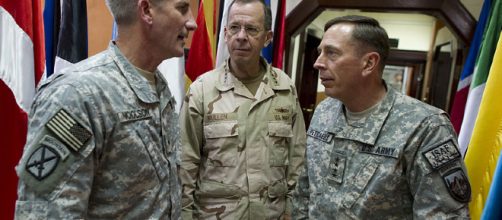Given that tensions between the United States and Russia have increased since the election of 2016, the allegations levied against Moscow by U.S. Army General John Nicholson are sure to ratchet up the conflict even more. Back in March, General Nicholson told an interviewer with the BBC that the U.S. military suspects Russia of supplying the Taliban in Afghanistan with weapons. Specifically, General Nicholson said that Russia is using Tajikistan, a former part of the Soviet Union, to smuggle items across the border into Afghanistan.
Ethnic Tajiks make up a sizable portion of Afghanistan's population, although very few serve as part of the Taliban.
Traditionally, Taliban fighters come from the country's Pashtun ethnicity, which has been in control of Afghani politics for hundreds of years. General Nicholson also accused Russia of inflating the number of ISIS fighters in Afghanistan in order to legitimize support for the Taliban. Since 2016, Taliban and ISIS fighters have engaged in battles against one another, especially in eastern Afghanistan where the country borders the terrorist haven of Waziristan in Pakistan.
Many of General Nicholson's claims have been backed up by officials with the Afghan National Police, who claim that they have found Taliban fighters armed with Russian-made rifles, pistols, heavy and light machine guns, and Night Vision Goggles.
Although the Taliban have long used Russian weapons left over from the failed Soviet invasion of Afghanistan in 1979, the implication here is that the Taliban are using more recently made equipment.
Contentious claims
General Nicholson first accused Russia of supplying the Taliban back in 2016. At that time, he also implicated Iran for leading a push to legitimize the terrorist organization. Many of these concerns came at a time when the American-backed government in Kabul had made motions to engage the Taliban in peace talks.
It should also be noted that not all U.S. military officials agree with General Nicholson's statements. Lt. General Vincent R. Stewart, the director of the U.S. Defense Intelligence Agency, said in May 2017 that he has yet to see any physical evidence of Russian support for the Taliban.
U.S. Defense Secretary James Mattis, himself a former general in the United States Marine Corps, has gone on record as saying that it "doesn't make sense" for Russia to arm the Taliban.
NATO Secretary General Jens Stoltenberg of Norway has also claimed that he is skeptical of General Nicholson's claims.
Long war
At this point in time, the U.S. military has been involved in Afghanistan for seventeen years. Despite the wealth and power of American armed forces, the Taliban currently threaten 70 percent of Afghan territory. It is also undeniable that the Taliban have become a much more "high-tech" force over the last seventeen years, with reports of Taliban special forces units employing night vision goggles, state-of-the-art weaponry, and the type of tactics one might expect from groups like the U.S.
Special Forces or the Afghan Special Forces.
President Donald Trump has recently shifted towards a policy of aggression against the Taliban by ending U.S. peace talks with the group. President Trump also decided to send thousands of additional U.S. troops to the country last summer. With the recent naming of John R. Bolton as the U.S. National Security Advisor, some speculate that President Trump could reinvigorate America's war in Afghanistan.


